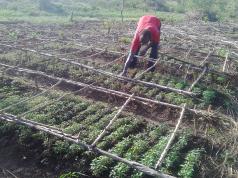HADS promotes livelihoods and self-sustainability for the disadvantaged to reduce their over dependence on donor funds and assistance for their day to day life and basic needs. HADS’ programmes which range from agriculture to business start-ups are some of the remarkable efforts for developing sustainability, improving household income and creating jobs in the low income communities
In the recent past, HADS’s projects have resulted directly in the creation of hundreds of jobs and significant increases in income for women. These successes have given many women their first job and the unprecedented ability to add to and often be the only source of family income. Despite this progress, there is tremendous unrealized opportunity to create additional opportunities for sustainable economic and entrepreneurship for women in many communities.
Our goal is to help the disadvantaged women in the world achieve financial independence and security by helping them build skills and resources to start microenterprises. HADS also respectfully seeks funding from a number of funding agencies to provide training women entrepreneurs, help establish new businesses, and create new jobs for women. Through our logistics management services, we link trainees and apprentices to our logistics bases which provides cheap Labour and gives the participants an opportunity to learn from the superiors in the workshops on how to maintain and repair various mechanical equipment, motor cycles, and vehicles.
The HADS range of livelihoods and self-reliance services include the following among others:
- Provision of livelihood and enterprise skills training so that trainees can engage in income generating activities that will reduce poverty, improve standards of living and thus contribute to the communities’ social and economic development.
- Promotion of youth and adult literacy, non-formal education and training at national, regional and district levels, particularly in rural areas;
- Establishment of model Skills Training Centers – mainly Community Skill Training Centers (CSTCs), Vocational Training Centers (VTCs) and rural TVET Centers – in geographically and socio-economically diverse environments. These centers provide systematic skills training to educationally disadvantaged people living mainly in rural areas;
- Talent management through the identification of talented and skilled people and bringing them closer to cities where their services can be better valued and rewarded.
- Help to reduce and alleviate poverty in selected communities by enabling poverty-stricken youths and adults to improve their livelihood potential and capacities;
- Train and encourage the population in the target communities to engage in Agriculture, Animal Husbandry and Fisheries, both for domestic consumption and income generation.
- Establishment of micro Enterprises and investment clubs.
- Vocational skills trainings, which vary from community to community depending on the economic and social state of the area. Such skills include tailoring, agriculture, hair dressing, carpentry, mushroom growing, hand crafts, and computer training
- The HADS conducts market surveys and ensures that the income generating activities being introduced in the area are the most suited and will give the best results. Thus we create market linkages for the products produced by our project beneficiaries.
